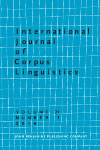
International Journal of Corpus Linguistics
Scope & Guideline
Empowering Scholars to Decode Language
Introduction
Aims and Scopes
- Corpus-based Research:
The journal emphasizes empirical studies using corpora to investigate linguistic structures, language use, and discourse across different genres and registers. - Multidisciplinary Applications:
It covers a wide range of applications, including but not limited to sociolinguistics, pragmatics, discourse analysis, and language teaching, showcasing the versatility of corpus linguistics. - Technological Integration:
The journal explores the integration of technology in corpus linguistics, including natural language processing (NLP) tools and software development for corpus analysis. - Variability and Change:
A consistent focus on linguistic variability and change, examining how language evolves over time and across different social contexts. - Pedagogical Insights:
The journal provides insights into the application of corpus linguistics in language education, providing resources and methodologies to enhance language teaching and learning.
Trending and Emerging
- Digital Communication and Social Media:
Recent publications increasingly address language use in digital contexts, including social media and online communication, reflecting the growing importance of these platforms in modern discourse. - COVID-19 Related Language Studies:
A significant trend is the exploration of language related to the COVID-19 pandemic, showcasing how corpus linguistics can illuminate public discourse and communication strategies during global crises. - Interdisciplinary Approaches:
There is a rising interest in interdisciplinary research that combines corpus linguistics with fields such as psychology, sociology, and health communication, highlighting the journal's expanding scope. - Technological Innovations in Corpus Linguistics:
The integration of machine learning and NLP tools is a notable trend, as researchers seek to enhance corpus analysis methods and improve the accessibility and usability of corpus data. - Pragmatics and Discourse Analysis:
Emerging themes include a heightened focus on pragmatics and discourse analysis, particularly in relation to engagement strategies in various communicative contexts.
Declining or Waning
- Traditional Linguistic Structures:
There seems to be a waning focus on studies solely addressing traditional linguistic structures in isolation, as researchers increasingly prioritize contextual and usage-based analyses. - Purely Theoretical Frameworks:
There is a noticeable decrease in publications centered around purely theoretical frameworks without empirical backing, as the journal increasingly values data-driven research. - Limited Genre Analysis:
Research focused exclusively on a narrow set of genres appears to be declining, with a shift towards more comprehensive analyses that encompass a variety of genres and contexts. - Historical Corpus Studies:
While historical linguistics remains relevant, there is less emphasis on purely diachronic studies compared to the growing interest in contemporary language use and real-time discourse analysis.
Similar Journals
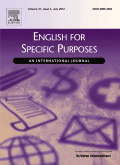
ENGLISH FOR SPECIFIC PURPOSES
Innovating the intersection of language and specific purposes.ENGLISH FOR SPECIFIC PURPOSES is a premier academic journal published by Pergamon-Elsevier Science Ltd, focusing on the intersection of language and specialized professional communication. With an impressive impact reflected in its Q1 quartile standings in both Education and Linguistics and Language, this journal serves as a vital resource for researchers, professionals, and students dedicated to the study and application of English in specific contexts. The journal has been in circulation since its inception in 1980, providing a platform for cutting-edge research that enhances understanding and innovation in language use across various fields. With a Scopus ranking placing it in the top percentile, it presents a curated selection of high-quality articles, reviews, and interdisciplinary studies that explore the diverse applications of English for specific purposes in educational and professional settings. Although it does not offer Open Access options, it remains a significant publication in its respective categories, ensuring that vital insights into language's role in professional and educational contexts are widely disseminated and recognized.
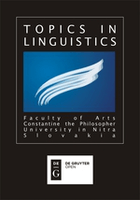
Topics in Linguistics
Fostering Collaboration in Linguistic StudiesTopics in Linguistics is a premier academic journal published by SCIENDO, specializing in the dynamic and expansive field of linguistics. With its Open Access model adopted since 2013, this journal ensures that groundbreaking research is readily accessible to scholars and enthusiasts alike, fostering collaboration and advancement in language studies. Indexed in prominent databases, it holds a Q2 ranking in the linguistics category for 2023, indicating its influence and relevance within the academic community. Hailing from Germany, the journal has established a strong international presence, ranking #291 out of 1088 in Arts and Humanities and #349 out of 1167 in Social Sciences—placing it in the top 25% of journals within these fields. Topics in Linguistics serves as a vital platform for researchers to disseminate innovative findings and engage with ongoing debates in the linguistics landscape, making it an essential resource for students, professionals, and academics committed to exploring the intricate layers of language and communication.
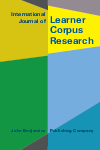
International Journal of Learner Corpus Research
Transforming Language Learning with Data-Driven InsightsThe International Journal of Learner Corpus Research (ISSN: 2215-1478, E-ISSN: 2215-1486), published by JOHN BENJAMINS PUBLISHING CO, stands at the forefront of research in the fields of education and linguistics, with a notable impact demonstrated by its Category Quartile rankings of Q2 in Education and Q1 in Linguistics and Language for 2023. This distinguished journal, based in the Netherlands, presents cutting-edge studies that focus on learner corpus research—an area that merges linguistic analysis with practical applications in language learning and teaching. Spanning an impressive convergence period from 2015 to 2024, it has established itself as a vital resource for researchers, educators, and students eager to explore the nuances of language acquisition through empirical data. Notably, its high Scopus rankings underscore its significance within the academic community, making it a must-read for those dedicated to advancing the understanding of learner language dynamics.
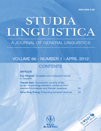
STUDIA LINGUISTICA
Pioneering Research in the World of LanguageSTUDIA LINGUISTICA is a prestigious journal published by Wiley, focusing on the dynamic and multifaceted fields of Linguistics and Language. With an ISSN of 0039-3193 and an E-ISSN of 1467-9582, the journal has been a vital resource for academics since its inception in 1947, diligently converging insights from history and philosophy of science alongside contemporary linguistic research. Demonstrating excellent scholarly impact, STUDIA LINGUISTICA proudly holds a Q1 ranking in Linguistics and Language as well as a Q2 in History and Philosophy of Science as of 2023, indicating its significance within these academic domains. Furthermore, it ranks in the top percentiles among similar journals, with a commendable 73rd percentile in Language and Linguistics and 70th in related social sciences. Although it does not offer Open Access, its contribution to the discourse of language studies is underpinned by rigorous peer-review processes and commitment to advancing theoretical and empirical research. For researchers, professionals, and students alike, STUDIA LINGUISTICA remains an essential platform for disseminating impactful linguistic scholarship worldwide.
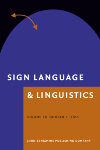
Sign Language & Linguistics
Elevating Research in Sign Language StudiesSign Language & Linguistics is an esteemed academic journal published by John Benjamins Publishing Co, dedicated to advancing the field of sign language studies and linguistics. With an ISSN of 1387-9316 and an E-ISSN of 1569-996X, this journal has earned a prominent place in the linguistic community, achieving a Q1 ranking in both the Linguistics and Language category, and standing out within the Scopus rankings, placing in the 77th percentile among the Arts and Humanities and 75th percentile in the Social Sciences categories. Sign Language & Linguistics spans over two decades of research, offering comprehensive insights and analyses from 1998 to 2024, promoting high-quality scholarly communication. Aimed at researchers, professionals, and students alike, this journal is essential for those exploring the intersection of sign languages, linguistics, and cultural studies, facilitating progressive discourse and fostering an understanding of this vital mode of human communication.

Linguistica e Filologia
Connecting Historical Insights with Contemporary Discourse.Linguistica e Filologia is a prominent academic journal published by UNIV DEGLI STUDI BERGAMO that offers an Open Access platform since 2002, fostering scholarly communication in the fields of linguistics, philology, and comparative literature. With a commitment to advancing understanding in these disciplines, the journal serves as a vital resource for researchers, professionals, and students alike. Its content encompasses diverse theoretical and empirical studies, critiques, and analyses of language and literature, encouraging interdisciplinary dialogue. Hosted in the picturesque city of Bergamo, Italy, the journal aims to bridge gaps between historical and contemporary linguistic practices, enhancing the global discourse on language studies. With a focus on quality, transparency, and accessibility, Linguistica e Filologia plays a crucial role in shaping the future of linguistic scholarship and is an invaluable reference for anyone interested in the intricate relationships between language and culture.

Journal of Greek Linguistics
Navigating the Intersection of Language and HeritageThe Journal of Greek Linguistics, published by BRILL, is a premier platform dedicated to advancing the study of Greek language and its historical and contemporary implications within the broader field of linguistics. With an impact factor recognized in the linguistics community, this journal significantly contributes to the academic discourse surrounding Greek linguistics and its relevance in cultural and social studies. First made open access in 2016, it is now accessible to a global audience, facilitating a collaborative environment for researchers, scholars, professionals, and students alike. The journal is proudly positioned in the Q2 quartile for linguistics and language, reflecting its esteemed standing in the academic community, and it ranks within the top 30% in both the Arts and Humanities and Social Sciences categories according to Scopus. With a focus on the intersection of language, culture, and society, the journal invites contributions that offer new insights and promote interdisciplinary research. The Journal of Greek Linguistics continues to be an essential resource for those engaged in the rich and evolving conversation about the Greek language.
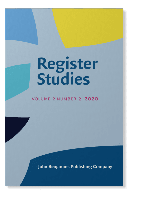
Register Studies
Unveiling Linguistic Diversity Across ContextsRegister Studies is an innovative and vital journal dedicated to the exploration of linguistic registers and variability in language use across diverse contexts. Published by John Benjamins Publishing Co, this journal serves as an essential resource for researchers and professionals in the fields of linguistics, sociolinguistics, and communication studies. With its emphasis on empirical research and theoretical advancements, Register Studies aims to uncover the nuances of language in social interaction, providing a platform for high-quality scholarly work. Although specific accessibility options are not outlined, the journal adheres to rigorous academic standards and strives to contribute significantly to the understanding of language's role in society. By fostering an interdisciplinary dialogue, Register Studies equips students, researchers, and educators with the insights necessary to navigate and contribute to the ever-evolving landscape of language studies.
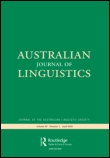
Australian Journal of Linguistics
Elevating Understanding of Language and SocietyThe Australian Journal of Linguistics, published by Routledge Journals, Taylor & Francis Ltd, stands as a distinguished platform in the field of linguistics, fostering rigorous academic discourse since its inception in 1981. With an ISSN of 0726-8602 and an E-ISSN of 1469-2996, the journal has achieved a notable Q2 ranking in the linguistics and language category for 2023, indicating its quality and relevance within the academic community. With a Scopus ranking of #316 in Arts & Humanities and #373 in Social Sciences, it sits in the 71st and 68th percentiles respectively, underscoring its impact in the fields it encompasses. The journal aims to publish high-quality research articles that contribute to the understanding of linguistic theory, sociolinguistics, and applied linguistics, making it an essential resource for researchers, professionals, and students alike. The journal is based in the United Kingdom, at 2-4 Park Square, Milton Park, Abingdon OX14 4RN, Oxon, England, and actively encourages contributions that can expand the current linguistic discourse, reinforcing its commitment to highlighting diverse perspectives in language research.
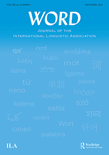
WORD-JOURNAL OF THE INTERNATIONAL LINGUISTIC ASSOCIATION
Elevating discourse through rigorous research and analysis.WORD-JOURNAL OF THE INTERNATIONAL LINGUISTIC ASSOCIATION is a leading peer-reviewed journal dedicated to advancing the field of linguistics and language studies. Published by Routledge Journals, Taylor & Francis Ltd, this esteemed journal has earned a reputation for its rigorous scholarship, reflected in its 2023 Q2 ranking in Linguistics and Language and its solid performance in Scopus Ranks. Encompassing a wide range of topics—from theoretical frameworks to empirical research—WORD serves as an essential resource for linguistics researchers, educators, and students alike. While currently not operating under an open access model, the journal is committed to providing high-quality, impactful research articles that contribute significantly to the linguistic community. With its convergence periods from 1998 to 2009 and 2015 to 2024, WORD continuously fosters the discourse of language studies, ensuring that critical insights and discussions are accessible for ongoing academic exploration.